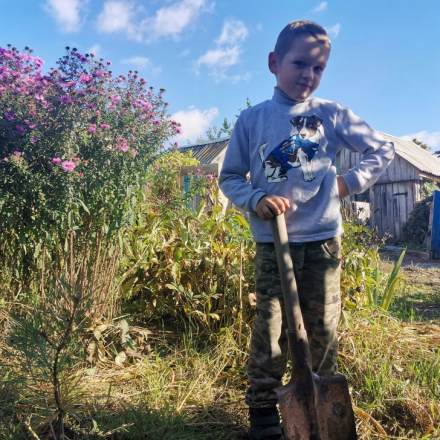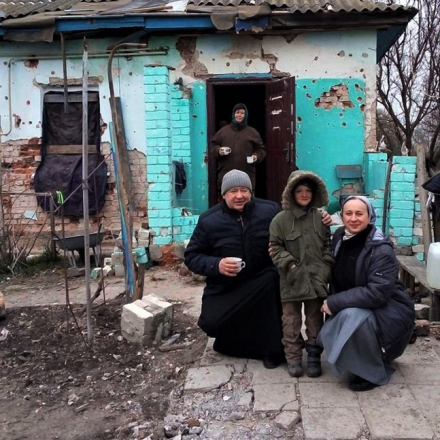"Olha, take our child, we have to get away from here. The Kadyrovites have come, they are terrible people."

After the liberation of Sloboda village in Chernihiv region from the invaders, seven-year-old Ivanko learned to smile again and planted a "tree for victory"
The explosions began at dawn on February 24 and were heard constantly. A few days later, an enemy missile flew toward them. It damaged the cellar and garage, smashed the doors and windows in the house, and shrapnel cut the roof. And on March 4, a column of Russian vehicles entered the village. The villagers counted 115 tanks and armored personnel carriers. They were driving along the road, with soldiers sitting on top of the tanks, pointing their guns at people... I couldn't believe it was happening in reality. I thought it was a bad dream. May God have mercy...
This is how Olha remembers the beginning of the war. The village of Sloboda in Chernihiv region, where she lives with her husband Mykhailo and grandson Ivan, is not far from the border with Belarus. However, the woman believed to the last that there would be no war. And even if the worst were to happen, it would not reach them. "Our Sloboda is not even on the map," she reassured her friends. "But it happened... They found us without a map, they came here... Angry, nervous, with weapons. They immediately took away people's phones so that no one could call anyone else."
On that March day, first my grandson came, saying, "Grandma, the soldiers are already near the club. After a while, her husband said, "Get ready Olha, we have to run away and save the child. Kadyrov's men have come, they are terrible people. They are breaking windows in shops and circling the village council in tanks."
The Kadyrovites and Buryats were the first to arrive in the village that morning. In the evening, the Russians came too. "We fled in what we were wearing," Olha recalls, "I only managed to grab my diabetes medication. We were walking through the field, Grads were hitting, shells were flying overhead... My husband and Ivan fell to the ground, and I was praying and thinking: whatever God gives, let it be..."
And God gave them the strength to walk to the neighboring village, and then to another one, to their family. Meanwhile, the occupiers got into their house. They set up their headquarters there. "Fifteen of them lived in our house," the woman says. "They took our clothes and blankets to the cellar and threw the potatoes into the garden. They were hiding in the cellar from the shelling when our troops were returning fire. My husband came back to take some food, and they allowed him to do so on the first day. He took some sugar and flour, fed chickens and pigs. The next day he came back, and they didn't let him in. There was an armored personnel carrier in the yard, a soldier came out and pointed his gun, "Don't come in!" My husband was running away through the garden, and the Russians were shooting after him. He fell into a ditch and stayed there for a day. Other people from our village were also hiding in that ditch with their children. They were wrapped in blankets, freezing, poor people... At night, I somehow got out of there and ran away. Later, when we returned, he took me to show me the ditch that saved him."
They returned home only a month later, after our military had driven the occupiers out of the village. Ms. Olya could not recognize her yard and house. Piles of garbage, everything was broken, mutilated, everything in the house was turned upside down. The "uninvited guests" cut up the chickens and pigs and ate them, leaving nothing of the food, only a battery of empty vodka bottles that they exchanged in the villages for food. "They cooked potatoes in a kettle. Why didn’t they take a pot and cook there? They are utterly useless," he shrugs.
They took eleven trailers of garbage out of their yard with a home tractor. They also covered the trenches that the Russians had dug in the garden behind the house.
It started to rain, so they put bowls and pots under the holes in the ceiling. The stove was broken, the walls were chipped... Neighbors invited us to their homes, but we decided to live at home and slowly repair the house ourselves. Almost no one in the village had gas or electricity back then.
When the first humanitarian aid was brought to Sloboda, the head of the village asked, "Olha, you live closest to the center, and your cooker is still intact. Let's at least make some tea for the people." "That's how God sent me good people," the woman recalls.
The beginning of April was cold, like winter. Mrs. Olha invited the guests to her home to drink tea and rest. Father Anatoliy, the rector of the Roman Catholic parish of Christ the King of the Universe in Kyiv, saw their home and took his head. "How can you live here? It's raining, the roof is leaking, you have a small child..." - "That's how we live. The main thing is that we are home," I said. "We will not leave you in trouble," the father promised.
Meanwhile, Ivanko was looking at the adults cautiously. "We started talking to him, trying to cheer him up, but the child was frightened and silent," recalls Yevhen Sihalov, a Caritas-Spes Ukraine employee. "My wife talked to him for a long time, telling him some funny stories. Only at the end of the conversation did the boy start to smile a little..."
The family was helped with home repairs under the Reconstruction program of Caritas-Spes: windows and doors were installed. "They helped us a lot," says Olha Ivanivna. "We had the front wall plastered, because it was full of holes. And Vitya, the foreman, decided to add a porch. He said it would be beautiful... They brought us clothes, blankets, pillows. After the occupation, we had almost nothing left: no dishes, no bedding..."
The state pension received by Olha and her husband Mykhailo is very modest. It is barely enough to buy food. Her daughter suffers from multiple sclerosis, and she constantly needs money for treatment. For health reasons, she cannot work. The grandparents take care of their grandson. Therefore, support from the Family to Family project is very timely for them. Caritas-Spes has been implementing this project of monthly financial assistance to Ukrainian families affected by the consequences of the war with the support and mediation of Caritas Poland since October last year.
It was then, in October last year, that we met. There were ripe pumpkins in the garden: Olha told me that she had planted half the garden with them. She dries the seeds and sells them to help herself and her children. The fragments of an enemy rocket were in the shed. And Ivanko was planting a pine tree. "If it takes root and grows, Ukraine will definitely win soon!" he assured us. He told us that he loves Lego, bicycles and swinging on the swings, but he likes going to school less because "it's very loud, everyone is running around, fussing, and you have to write in class, which is not very interesting."
... Ms. Olia is waiting for the heat to come. Then the clay will thaw, and she will be able to finish the second stove, she says, and anoint the ceiling with clay and whitewash it. The walls and wallpapers will have to wait. The main thing is that the roof is fixed. Praise God, we survived the winter. We are talking on the phone at the end of February. We hear children's laughter from the other side. "Come sit down for a minute. All he wants is to run around," laughs Olha. "Come visit us when it gets warmer. You will see how much my grandson has grown over the winter. He grows like a weed, and he's as fast as lightning!"
Ivanko asked me to tell you that his pine tree has taken root.












